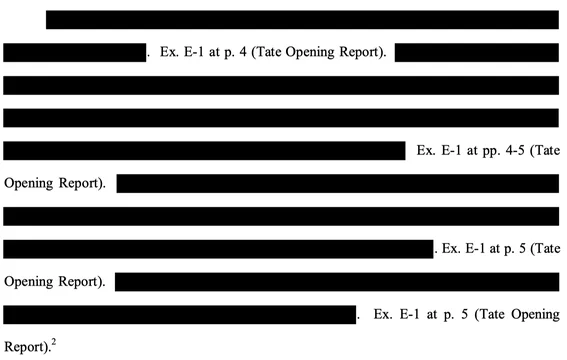Today I noticed for the first time what may be a new move in the redaction game. I neither like nor understand chess (the two may be related), but it feels like I witnessed the birth of the French defense.

As we've discussed ad nauseum, it has become standard practice for Judge Andrews to reject filings that redact exhibits in their entirety (or nearly so) with an oral order like the following:
ORAL ORDER: The redacted filing (D.I. 163 ) is REJECTED because parts of it are redacted in its entirety. Absent a compelling reason, supported by a statement under oath by a party, redactions in their entirety are impermissible; redactions must be done so as to redact the least possible amount of the materials submitted. Failure to make a good faith attempt at such redactions may result in sanctions, the most common of which would be simply unsealing the entire filing. Redacting in its entirety a document or parts of it that contains publicly available materials is prima facie evidence of bad faith. A revised redacted filing is DUE within five business days.
Vertex Pharms. Inc. v. Sun Pharm. Ind. Ltd., C.A. No. 20-988-RGA (D. Del. Apr. 12, 2023).
Despite this repeated refrain, I still see at least a couple such orders every month. This week, however, was the first time I saw a party take the step of submitting "a statement under oath by a party" at the same time it submitted its redactions, rather than waiting for them to first be rejected.
Interestingly, the statement itself was fairly light on detail stating only that it was redacting "the proprietary formulation contained in its ANDA" and describing the harm as:
If this Protected Information is made public, Lupin could suffer a clearly defined, substantial and specific harm, including, but not limited to, financial damage, business damage, damage to commercial standing, and/or other irreparable harm. Competitors would improperly and unfairly benefit from the disclosure of the Protected Information and would likely use it to enhance their market or negotiation position and cause Lupin to lose its competitive advantage in the highly competitive generic pharmaceutical marketplace. Accordingly, Lupin has a legitimate interest in protecting this information from disclosure, which warrants redaction of this information, and a clearly defined injury will occur to Lupin if the Protected Information in Exhibits 8 and 9 accompanying Vertex’s Letter Brief and Exhibit E accompanying Lupin’s Opposition Letter is not redacted.
Id., D.I. 170.
This was apparently enough for the Court to allow the redactions as Judge Andrews issued a brief oral order the very next day:
The proposed redactions (D.I. 169 ) as supported by the Declaration (D.I. 170 ) are ACCEPTED
Id., D.I. 171.
Yahtzee!

Now, before you get too excited about this new stratagem, I should note that the requested redactions were actual fairly minor. Importantly, none of the included exhibits were actually redacted in full.
I do think its a suggestion I'll keep in my own toolbox going forward though, as I'd certainly rather see the "redactions accepted" order than the "try again" order.
If you enjoyed this post, consider subscribing to receive free e-mail updates about new posts.





